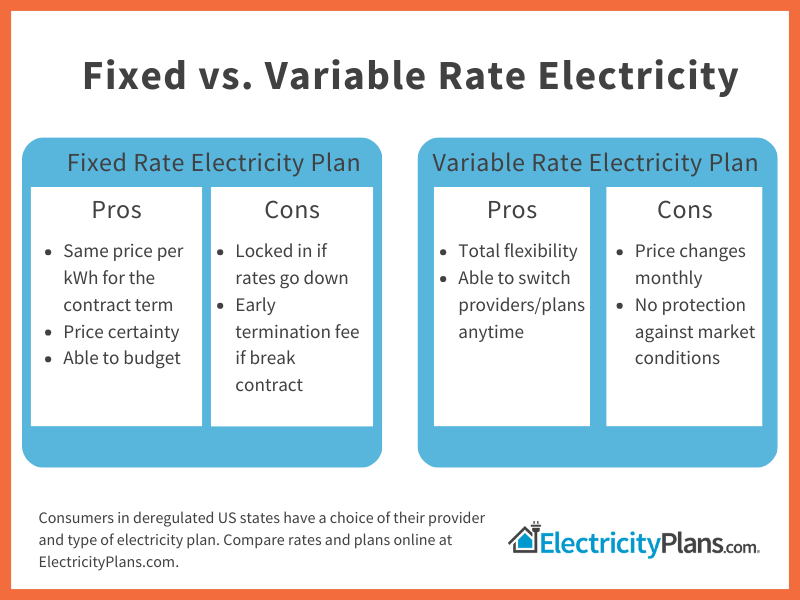Choosing the electricity plan type is just one of many choices you’ll have when choosing your new electricity plan. There are fixed, variable and indexed electricity plans. It can be confusing to sort through the different options available, especially if you’ve never bought an electricity plan before.
Take a breath, because finding the perfect plan rate type for your family or small business is a lot easier than it looks. We’ll walk you through what you need to know about electricity pricing. And we’ll call out things that are different in Texas, the biggest deregulated electricity market in the U.S.A.
What’s in this Article
- Types Of Electricity Plans
- Pro & Con of Fixed Rate vs. Variable Rate Electricity Plans
- Types of Electricity Plans in Texas
Types Of Electricity Plans
Here are the main types of electricity plans. These definitions are consistent across all deregulated electricity markets.
- Fixed Rate Electricity Plan: A fixed rate electricity plan charges the same rate per kWh of electricity for the term of your agreement. The price is the same no matter how much electricity you use. The only way your price will change is if there are changes in the delivery fees.
- Variable Rate Electricity Plan: A variable rate electricity plan is a month-to-month electricity plan. Your rate can change every month, typically with no limits. Your provider is required to publish the next month’s rate. This gives you notice of what you’ll pay each month.
- Indexed Rate Electricity Plan: Indexed rate electricity plans are typically tied to the trading markets for electricity. Your rate will change monthly with no upper (or lower) limits.
Fixed Rate Electricity Plans – Price Certainty & Protection
Fixed-rate electricity plans are the most popular option with electricity customers and the type of plan we recommend. You’ll get a fixed rate for electricity, no matter what happens in the electricity market.
When prices rise for other electricity customers, a fixed-rate electricity plan doesn’t budge. The price remains stable throughout the length of the contract.
On the down-side, if prices drop, you may regret locking in. And breaking the contract can be costly, depending in what state you are in.
Some states like Connecticut and Pennsylvania limit the amount that retailers can charge for an early termination fee. But in Texas, you could pay $150 – $300 to terminate your contract. That’s why some electricity providers in Texas will reimburse your early termination fee to get you to switch. For example, Rhythm will reimburse your ETF up to $150.
Fixed rate electricity plans can vary in term length. The most common contact terms are 6, 12, 24 and 36 months. But if you see an odd term, like 8, 15 or 22 months, you should take a closer look. Those odd term plans typically give great value.
We recommend Basic Fixed Rate plans. These are plans without tiered rates, bill credits or other gimmicks. In 20+ years of evaluating electricity rates, basic fixed rate electricity plans offer the best value to consumers.
Variable Electricity Rates – Flexibility
Variable-rate electricity plans change in cost from month to month, based largely on the cost of wholesale electricity. But, there’s no contract!
Variable rate electricity plans are a great option if you are:
- Not ready to commit to a long-term plan.
- Switching electricity plans in summer and want to see if fixed rates drop in the fall.
- Selling your home or have rental property that you’re making ready for a new tenant
- Using it as a bridge plan to shift your expiration date to a different month.
On the downside, variable-rate plans offer absolutely no protections from fluctuations in the cost of electricity. That can make variable plans risky for customers who can’t absorb a sudden increase in electricity costs.
Most suppliers show the historical pricing of their variable-rate plans somewhere on their website. And you’ll quickly see that after the first month’s introductory rate, you’ll pay a rate that’s around 30-50% higher than a fixed rate plan.
Indexed Electricity Rates – Playing the Market
An indexed electricity rate means that the price of your electricity is tied to another underlying variable. These plan rates are highly volatile. For most indexed electricity rates, the underlying variable is the price of a publicly available index such as the NYMEX natural gas futures contract.
In 2021, the Texas Public Utility Commission ruled that retailers could no longer offer indexed plans to residential and small business customer. This protects consumers from signing up for an index plan that looks affordable but has an unlimited upside risk.
Pro & Con of Fixed Rate vs. Variable Rate Electricity Plans
There is no perfect electricity rate type for everyone. As we discuss above, there are lots of options.
But in our 20+ years of experience with deregulated electricity, fixed rates are our top recommendation for best type of electricity plan.
Here are the pro and con of each plan type, which supports that recommendation.

Types of Electricity Plans in Texas
Texas has been deregulated since 2001, with over 85% of Texans having their choice of electricity provider. There are a lot of different types of fixed rate plans when you’re ready to choose from.
- Basic Fixed Rate Electricity Plans: This is our top recommendation for type of electricity plan in Texas. You’ll pay the same rate for every kWh of power you use, with delivery fees passed through at cost. Once you enter your zip code, select basic fixed rate using Advanced Search.
- Tiered Rate Electricity Plans: Tiered rate electricity plans charge a different price per kWh depending on how much electricity you use during the month. These look like low prices but make sure you know your usage before you sign up. Search by tiered rate/bill credit plans using Advanced Search.
- Bill Credit Electricity Plans: Bill credit electricity plans give you a bill credit when you use a certain amount of electricity. Make sure you know your usage and how many times each month you will hit the required level. Search by tiered rate/bill credit plans using Advanced Search.
- No-Deposit Electricity Plans: Prepaid electric plans let you pay upfront with no credit check. You also pay as you go, checking your monthly balance to your energy usage to add more funds.
- Time-of-Use Electricity Plans: Often offering free nights and free weekends, these electricity plans lower rates during off-peak hours. If you can shift your electricity usage to certain times, these can give you a lower average price.
- Green Energy Plans: Green energy plans let you contribute to a cleaner environment in Texas. Renewable Energy Certificates back these plans. That means you will support wind and power resources.
- Solar Buyback Plans: More and more Texas residents have opted for solar panels. Solar buyback plans ultimately reward you for this choice. Any excess energy generated gets sent to the grid, and you’ll receive a credit you can put toward future bills.
- Plans for EV Owners: Did you invest in an electric vehicle (EV)? If you charge at home, these plans offer savings when you power your vehicle during certain hours.
Want to learn more about shopping for electricity in Texas? We thought you might. That’s why we wrote The Definitive Guide to Shopping for Electricity in Texas. In 10 minutes you’ll know everything there is to know.
Compare Electricity Plans & Rates in Texas
